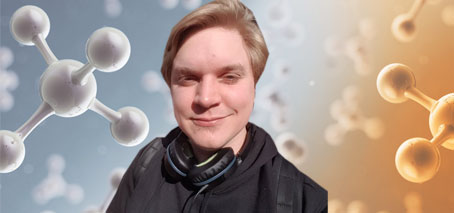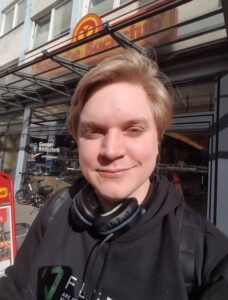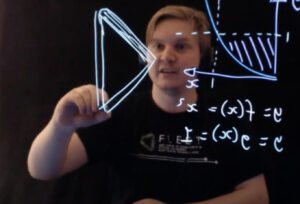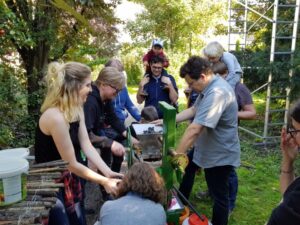Job hunting, working in industry, and staying focused on the path forward
Hi FLEET, I’m Jesse Vaitkus. I was a PhD student under Prof. Jared H. Cole working on novel transport problems using the Non-Equilibrium Green’s Function (NEGF) method. After graduating I worked on similar problems for him until I left to begin my current job at HQS Quantum Simulations.
I’m a condensed-matter physicist now working for HQS Quantum Simulations in Germany. I love to talk science, and am keenly interested in data presentation and how to most effectively communicate ideas.
My time at FLEET
One of the aspects at FLEET I really appreciated were the networking sessions. You’ll often find that at conferences – despite mingling and networking being suggested – people just bunch off into their usual friendship groups. FLEET’s insistence on inter-group mingling pushed us past this and as a result I’m now good friends with several scientists at various nodes, and this facilitates meeting even more people so my ‘friendship groups’ now span Australia-wide.
In follow-up to this, working on these centralised themes really enhanced my communication to ‘adjacent field’ scientists. i.e., people working on a similar (or the same) topic, but coming at things from a completely different perspective.
Often when learning sci-comms we learn to talk to ‘the layman’ who doesn’t understand what we are talking about.
But being able to talk to an experienced scientist in the field (possibly one far more experienced than you) who speaks using different terminology is an interesting challenge.
Lastly, when writing this response it’s been hard to separate FLEET and my former supervisor and FLEET CI Jared Cole. I was Jared’s student long before FLEET existed, and when writing this I couldn’t think of a good way to untangle what was solely him and what was solely FLEET, as it is my opinion that if I were not in FLEET, I’m sure he would have gone out of his way to make it so that I had access to these (or similar) opportunities. I could not have been where I am without the support of Jared. He routinely helped me formulate my interpersonal, presentation and scientific skills and provided me opportunities to further my career even when they would otherwise cost him time or money. His guidance, knowledge and mentoring have made me the man I am today. If you’re reading this Jared, sorry to get all mushy on you.
“So what do you do now? Tell us about life post-FLEET”
HQS is a German company providing software for material scientists in the chemical industry and academia, using sophisticated quantum-level models of the properties of molecules and materials to give researchers the deeper insights they need to identify the perfect solution.
A lot of our active research and development is aiming to meet the gap between classical computers and quantum computers. HQS actively looks to prepare solutions, code and infrastructure to facilitate future quantum computation. (See our Quantum Algorithms team’s contributions on GitHub for specific information and examples.) To find out just how we do it and what kinds of outputs one can get I recommend looking up the various talks by HQS leadership.
My official job title at HQS is “Ab Initio Specialist” though on our current team page it has me listed as “material algorithms”. In this regard I develop tools, interfaces, and run simulations of atomic systems using methods like DFT (Density Functional Theory). I also more generally work on tools for our other condensed-matter projects as needed. These can be targeted/bespoke for customers or general tools that we as a company would like to use internally or offer to the wider public.
My ‘scientific’ RMIT/FLEET skills in condensed matter physics and coding are integral to my job, but so too are ‘wider’ skills such as time management and my verbal and written communication skills.
I really appreciate how the overlapping and non-overlapping expertise of people is used to achieve interesting new things at HQS. This interconnectedness makes it possible for our projects to span much wider technological and scientific fields, leading to really interesting results greater than the sum of their parts. Being a part of that chain gives me great satisfaction.
Since starting at HQS I’ve greatly increased my software development skills: (Unit tests are good! Use them!) and communication is a skill that I continue to work on. Working with programmers (with no scientific background) has helped show me the gaps I had in my communication and what kind of assumptions I had been making. Unfortunately my German skills need some work but HQS has been very supportive in this regard.
“How’d you get the job? Any advice for other job hunters?”
Partly, it was luck! While I was applying for jobs I received a message from an old friend telling me that a position was being advertised where he worked. So I wrote a cover letter, responses to the application criteria, and attached my CV.
Job-hunting after my PhD was a challenge. Throughout any interview, I’d be constantly stressed about saying something stupid or incorrect for fear I might jeopardize my chances. By the end of my first interview with HQS I was convinced I didn’t have it. In the second interview they asked me to write answers to four questions and I couldn’t even answer the fourth! (Turns out the fourth was an open problem and they wanted to explore how I might tackle it.)
Initially I was somewhat hesitant about an ‘industry’ job. I asked the friend who told me about the opening how he felt about working in the company, and he told me that it was the happiest he’d ever been so I took it.
Advice for other job hunters…
One of the key things in the modern era is your public profile and how you cultivate it. Employers will search you and look at your social media. Set your Facebook to ‘friends only’ and avoid compromising posts. If you’re going to use Twitter, try not to use your real name/face and most certainly try to avoid ‘hot takes’.
Though it may seem a bit lame, start a LinkedIn account and a professional Twitter account. Keep them business. When you have an academic success, opportunity or something that otherwise sets you apart, post it. When you meet someone from industry or another institution that is related to you, add them. By the time you reach the point where you want to apply for a job, your page should be littered with your awards, images of successes and your connections should be plentiful. These connections will prove to be important as most of the time it really is who you know.
The last aspect of job-hunting is skill acquisition and demonstration. Think you’re good at coding? Put a tool you coded online. Think you’re good at writing? Write an article and put it online. If you think you aren’t good at something you should be, then work at it.
If you don’t have contacts, make them. Email people; you’d be quite surprised at how often people respond to emails, willing to give you a chance. Say you want to be a Marine Biologist but don’t know where to start, send a message to (a local) one on Twitter, people respond to those interested in their field and are often willing to give you a chance if you show you’re up for it.
My first science job (and subsequent publication) was from doing just that, I asked everyone in the physics department if they had any summer work and (my now good friend) Dr Andrew D. Greentree (now Prof. Greentree) gave me a chance, something I still appreciate to this day.
“Tell us more about your career in science”
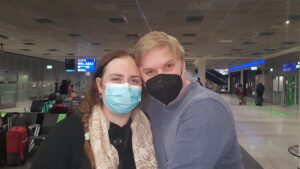
“After not being able to see each other for the past six months due to Coronavirus restrictions, it was pretty sweet being reunited with my wife Jessica at Frankfurt airport.”
I initially pursued electronics as a career until my high school teacher’s passion for physics pushed me that way. In VCE I studied the various ‘hard’ maths, physics, English (language), and Electrotechnology. If I had known the course I would eventually end up applying for I might have taken Chemistry and Biology in place of Electrotechnology but I don’t regret it.
I also chose to learn Auslan (Australian sign language) instead of German as I couldn’t see any future need for German. Oops! That said, learning Auslan was worthwhile and it should be taught in more schools.
My degrees in university were:
- B.Sc., (Nanotechnology)/B.Sc., (Applied Sciences) with distinction
- B.Sc., (Applied Sciences)(Hons) First Class
- PhD (Physics)
As for career advice, I think a resounding piece of wisdom comes from the writer David Kemper through the mouth of Jean-Luc Picard in Star Trek: The Next Generation “It is possible to commit no mistakes and still lose. That is not a weakness; that is life.”
This quote resonates with me strongly. You don’t pick your adversities, they one way or another pick you. You can be the best, the brightest, but setbacks happen. The key thing is to focus on the path forward.
In my career journey I had multiple setbacks on my way. I had people tell me repeatedly that I didn’t have what it takes. That if I took this course or that one that I would fail. This isn’t malice on their part, it’s ignorance. They do this because to them it’s a numbers game. If 90% of people with the same circumstances as you would fail, you’re no different to them and they want to ‘save’ you from suffering. Some call this the ‘soft bigotry of low expectations’.
In the end if you never try, then you’ve already failed. So wouldn’t you rather know for yourself?
If you are willing to put in the work, put in the time, you can get there eventually. That’s not to say that success is just guaranteed from effort, maybe your grades really weren’t good enough and that you might need to take bridging courses, sometimes you might even need to repeat subjects. But my point is that if you truly want it, seek out all opportunities, work hard then you can do it if you want it enough. Take it from someone who’s been there.
But take care of yourself! Sometimes people like to joke that ‘PhD’ is short for ‘permanent head damage’, and science has a higher incidence of mental health issues than other faculties. You have to make sure you take the time to de-stress once in a while and get help if you need it. There’s no shame in it, if you had bronchitis you’d see a physician without thinking about it, your mind is no different than your lungs in this regard. Take care of yourself.
Lastly, if mentoring is possible, take it. People who have been at this for a while have knowledge that they’re willing to share. Myself included! If you ever want to chat my handle on Twitter is @DrVaitkus (though I tend to check it infrequently). I’m also on the FLEET Mentorloop network.
FLEET alumni
FLEET is developing a skilled workforce of future Australian science leaders. We are extremely proud of those members who have already moved on to great careers, making use of skills developed in their time at FLEET. Ultimately it will be FLEET alums as much as research outputs that define the success of the Centre. Read more alumni news at FLEET.org.au/alumni

